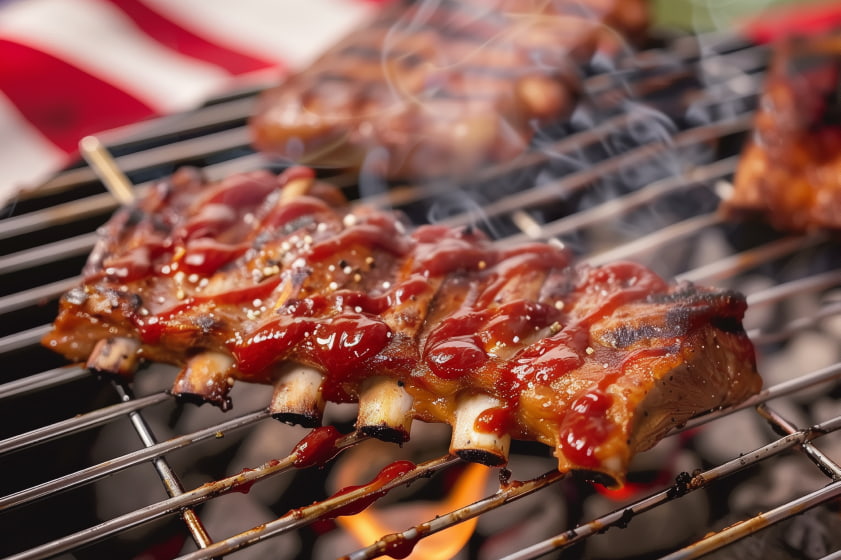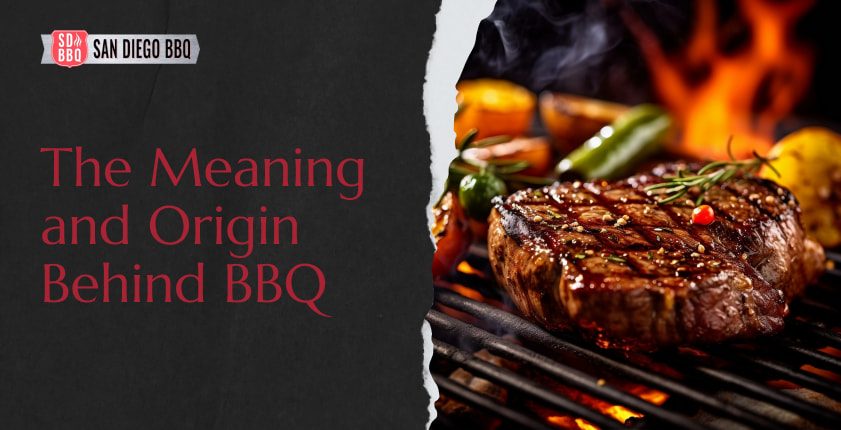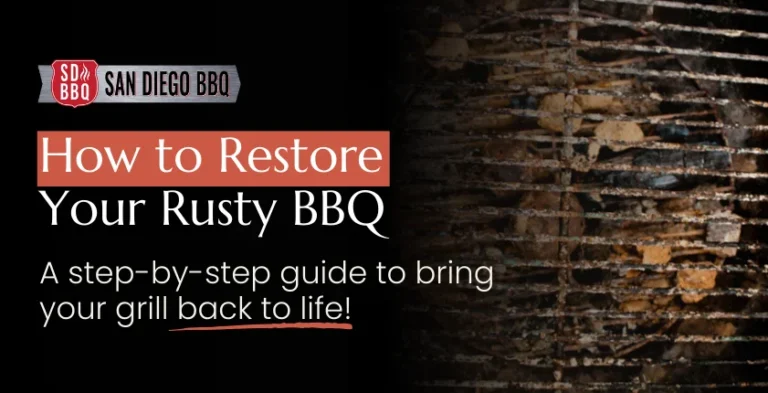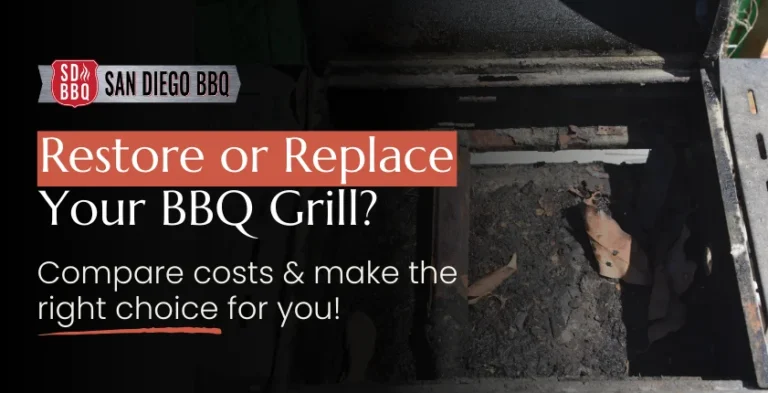BBQ goes beyond borders and cultures, from smoky ribs in the American South to skewers in Southeast Asia. But have you ever wondered where this cooking method originated and what the word “barbecue” itself means?
We want to take you back in time so you can explore all the exciting history behind the word barbeque.
Let’s uncover the ancient practices that gave rise to this tradition. And we will delve into the significance that has transformed BBQ into a global phenomenon. It’s time to dive headfirst into the ancient world and discover what BBQ stands for!
Tracing the Roots: The Global Journey of Barbecue
Barbecue is not just a sizzling dish at a summer party. It is more than that; it is something that is loved by many people all over our planet. And if you take history, you can trace the branch from prehistoric campfires to perfectly cooked marbled steaks and vegetables. And despite such a long gap from the beginning to the present, people continue to want to taste the flavorful food from the grill.
But it’s time to understand why it is called barbecue. It’s worth starting from the beginning when people first learned what it was.
Origin of the Word ‘Barbecue’
The word “barbecue” holds clues to its origin story. It comes from the Spanish word “barbacoa.” But this word also takes its history from another, older word, “barbacot,” which is indigenous to the Taíno Arawak tribes.
The Taíno people, inhabitants of the Caribbean, used a wooden framework called a “barbacot” for cooking meat over a fire. This tool served many purposes. They’re:
- Raising food off the ground for protection
- Smoking meat for preservation
- Providing a platform for grilling
In barbecue history, early Spanish explorers faced this cooking method in the 15th century. They used the term “barbacoa” in their speech. When Spanish conquistadors went further north, they brought this word with them. They introduced it to the populations of what would become the United States. Then, the word evolved into “barbecue” in English. It’s forever linked the technique to its local Caribbean origins.
Barbecue in Pre-Colonial Societies
Besides the origin of the word barbecue, let’s consider the method itself. The concept of cooking meat over an open fire is much older than the word. Evidence suggests that early humans were using similar methods as far back as 500,000 years ago. These early practices involved roasting meat on spits or over open pits. People used heat and smoke for both cooking and preservation.
Civilizations developed around the world. So, BBQ traditions took on unique characteristics:
- In ancient Egypt, hieroglyphs depict scenes of meat roasting over open fires.
- Polynesians used underground earth ovens to slow-cook meat and vegetables with hot stones.
- Similarly, in the Americas, local cultures like the Incas employed pits lined with hot stones. It’s for slow-roasting meats like llama and guinea pig.
These pre-colonial practices share different elements. So, we can’t say BBQ is fully American. However, the method is about:
- The use of a fire as the primary heat source.
- Cooking meat over an open flame or indirect heat.
- Using smoke for flavor and preservation.
The techniques and ingredients varied based on preferences and available resources.
The adoption and adaptation of these techniques by different cultures over centuries laid the groundwork for the different BBQ styles we see today. The global journey of BBQ is a testament to its appeal and cultural significance. It went from the low-and-slow pit cooking of the American South to the traditions of East Asia.
The American Barbecue: A Cultural Icon

The barbecue’s origins in the United States go beyond just cooking. It’s a cultural cornerstone. Its smoky flavor penetrates the deepest fabric of American life. From sitting in the backyard laughing to fiercely competing in national competitions, barbecue brings us together through a shared experience.
It’s a tradition passed down through generations. It’s a flavor that brings communities together. But is American BBQ truly unique? Or is it simply another course in the global feast of fire-kissed meats, a story told in countless cultures with countless variations?
Perhaps the answer lies not in its origins. It’s about the unique way America has claimed this culinary art form.
Regional Variations of American BBQ
The beauty of American BBQ lies in its diversity. Unlike a singular national dish, it encompasses a kaleidoscope of regional styles. Each boasts distinct flavors and techniques.
We can categorize the styles into three different parts of the country. Of course, you can find other, more different styles. But speaking of these three styles, we highlight the most popular ones favored by the people of America:
- The South. The undisputed king of American BBQ, the South boasts several regional powerhouses. In Carolina, slow-cooked pulled pork reigns supreme. It’s often seasoned with a vinegar-based sauce. Texas focuses on beef brisket, cooked over indirect heat with a simple salt and pepper rub. Memphis is known for its dry-rubbed ribs. They achieve a smoky flavor through slow cooking with hickory wood.
- The East Coast. Moving north in the BBQ origin, it takes on a different character. The Carolinas’ vinegar influence extends into Virginia. There, pulled pork is often served with a tangy sauce. New England BBQ leans towards grilled meats. It’s particularly seafood. It often features regional favorites like lobster and clams.
- The Midwest. Kansas City-style BBQ is a crowd-pleaser. It features slow-smoked meats like brisket, ribs, and burnt ends. They’re slathered in sweet and tangy tomato-based sauces. In Kentucky, mutton BBQ holds a special place. It’s cooked in a pit with a tomato-based sauce. It’s infused with regional bourbon.
These variations highlight the identity and history behind the word barbeque in different parts of the US. There are different preferences in meat, cooking methods, and sauces. However, they all contribute to the distinct character of each regional style.
Notable Figures in the History of American BBQ
The rich history of American BBQ wouldn’t be complete without acknowledging the key figures who have invented and shaped the growth and popularity of BBQ.
Few true legends have made a meaningful difference in the field of barbecue. And despite the contrast in centuries of living, they are united by barbecue culture. Therefore, we invite you to know them a bit more:
- Elijah Craig (18th century). Credited with inventing bourbon in Kentucky, Craig’s contribution goes beyond whiskey. Bourbon barrels are commonly used for smoking meats in Kentucky BBQ, making a unique flavor profile.
- The “Pit Masters” (19th & 20th centuries). These unsung heroes, often African American men who honed their skills during the era of slavery, were the true masters of pit cooking. Their techniques and recipes formed the foundation for many Southern traditions.
- Cleo “Miss Millie” Jackson (20th century). According to barbecue history, a pioneer in Kansas City-style BBQ, Miss Millie, opened the iconic restaurant in 1927. She focused on slow-smoked meats, sweet and tangy sauces, and hospitality.
- Franklin Barbecue (21st century). Aaron Franklin’s Austin, Texas, establishment has become a pilgrimage destination for enthusiasts. His commitment to using prime cuts of beef and pit-smoking techniques has redefined Texas BBQ.
These people represent the spirit of innovation and tradition. It continues to drive American BBQ forward. Their “Where was barbecue invented” stories showcase how it has evolved from practical cooking to a cherished experience.
American BBQ boasts a rich and distinct identity. However, it’s important to remember its origins in the broader global story. Local cooking techniques, Spanish exploration, and African American cuisine are all vital. It’s especially about BBQ development. The American type serves as a prime example of cultural exchange and adaptation. It transforms a universal cooking method into a beloved cultural icon.
San Diego’s BBQ Scene and Its Historical Influence
Apart from BBQ origin, let’s consider the San Diego BBQ scene. The city is known for its beaches and sunshine. It boasts a vibrant BBQ scene. Other regions have deep-rooted traditions. However, San Diego’s embrace of BBQ reflects its diverse population and welcoming spirit. Here’s a look at how the city has adapted and celebrated BBQ from around the globe:
- A Melting Pot of Flavors. San Diego’s scene is a mix of regional American styles and international influences. City offers everything from slow-smoked brisket to tangy Carolina pulled pork. Korean BBQ joints sizzle with marinated meats. Meanwhile, Mexican barbacoa offers a unique twist with shredded beef.
- Events and Competitions. San Diego’s love for BBQ isn’t confined to restaurants. To support the barbecue history and traditions, the city offers many events and competitions every year. The San Diego Blues, Brews & BBQ Festival mixes smoky meats, music, and craft beers. The California State Barbecue Championship attracts cooks from across the state. They showcase their expertise in many styles. The events foster a sense of community and friendly competition. It highlights the city’s passion for all things BBQ.
- Local Legends. Where did BBQ heroes originate? San Diego has its own set of heroes. There are restaurants like Coop’s West Texas BBQ, specializing in authentic Texas-style BBQ. Also, there is Smokin’ J’s BBQ, known for its award-winning brisket and ribs. They have become local favorites. These places put their own spin on classic styles. They attract devoted fans and contribute to the landscape.
San Diego’s approach to BBQ isn’t about rigidly following tradition. It’s a joyful exploration of tastes. The city has created a unique scene by embracing influences from around the country and the world. It reflects its diverse population and its love for grilled goodness.
The Future of Barbecue: Trends and Transformations
Barbecue isn’t just about the past and origin of the word. It’s a tradition that is always evolving. Technology advances and culinary preferences shift. So, we can wait for exciting changes in the future of BBQ. Let’s take a closer look at what might be sizzling on our grills in the years to come:
- Tech Takes to the Pit. Technological changes are poised to revolutionize the way we cook. Smart grills with temperature control and automated smoke generation will offer consistent results. It’s even for novice grill masters. Apps may guide us through cooking times. They may suggest recipes based on available ingredients. Imagine a future when you can remotely track your smoker from a phone while enjoying a drink!
- Sustainable Sizzling. Knowing how BBQ gets its name is interesting. However, sustainability is increasingly important for environmentally conscious grillers. We might see a rise in the use of biofuels and electric grills. We must offer eco-friendly alternatives to charcoal and propane. Sustainable wood sources and responsible meat production will likely become even more crucial.
- Globally Inspired Innovation. BBQ will continue to embrace global influences. Expect to see more fusion styles emerging. They’re Korean BBQ tacos or Vietnamese-inspired grilled meats with dipping sauces. Eaters might indulge in insects or lab-grown meat prepared with traditional techniques.
- Health-Conscious Choices. Indulgence is a big part of BBQ. However, health trends will likely influence some aspects. Leaner cuts of meat and plant-based alternatives might become more popular. Recipes may incorporate healthier cooking methods. They’re smoking and grilling instead of deep frying. Look for innovative side dishes that are both delicious and nutritious. It helps balance the richness of smoked meats.
Despite considering where BBQ comes from, its future is also vital. It promises to be a delicious adventure. Technology will make grilling easier and more efficient. Sustainability practices ensure we continue to enjoy this culinary tradition. With a global perspective and a focus on healthier choices, BBQ will continue to be a way to:
- Connect
- Celebrate
- Enjoy the art of cooking with fire
So fire up your grill after reading our “Where did BBQ originate?” article. Embrace the future. And get ready to experience the next evolution of barbecue! New techniques, unexpected flavors, and exciting technologies are all on the horizon. They’re waiting to transform your backyard cookout into an unforgettable culinary adventure.







